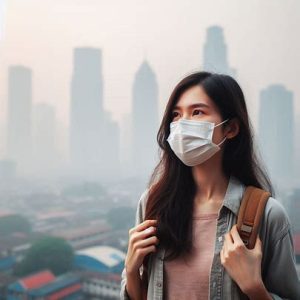Air pollution is responsible for millions of premature deaths worldwide. Travelers often underestimate how different environmental conditions, such as pollution, humidity, altitude, and allergens, can affect their respiratory health. Whether exploring a bustling metropolis or hiking through the mountains, understanding air quality is crucial to staying healthy.
One factor that can exacerbate air quality concerns is vaping. Many travelers carry flavorful vape carts but may not realize how environmental conditions can impact their vaping experience and overall lung health. Pollution, altitude, and humidity levels can all affect how the body reacts to inhaled substances, making it essential to be mindful of air quality while traveling.
Understanding Air Pollution and Its Impact on Travelers
 Major cities around the world struggle with air pollution. Smog, industrial emissions, and vehicle exhaust create a toxic mix that can cause respiratory issues, especially for those with asthma or allergies. Travelers visiting places like Beijing, Delhi, or Los Angeles may experience symptoms such as coughing, shortness of breath, and fatigue due to prolonged exposure to polluted air.
Major cities around the world struggle with air pollution. Smog, industrial emissions, and vehicle exhaust create a toxic mix that can cause respiratory issues, especially for those with asthma or allergies. Travelers visiting places like Beijing, Delhi, or Los Angeles may experience symptoms such as coughing, shortness of breath, and fatigue due to prolonged exposure to polluted air.
Pollution levels can fluctuate throughout the day, so checking air quality indexes (AQI) before heading out is a smart practice. Wearing a mask, limiting outdoor activities during peak pollution hours, and staying hydrated can help reduce health risks.
High-Altitude Travel and Respiratory Health
Traveling to high-altitude destinations like the Andes, the Alps, or the Himalayas presents unique challenges. Lower oxygen levels can lead to altitude sickness, which causes dizziness, headaches, nausea, and shortness of breath. People with pre-existing lung conditions should take extra precautions and consult a doctor before traveling to high elevations.
Acclimatization is key. Spending a few days at mid-altitude before ascending higher can help the body adjust. Drinking plenty of water, avoiding liquor, and getting enough rest also improve adaptation.
How Humidity Affects Breathing While Traveling
Both high and low humidity levels can affect respiratory health. In tropical destinations with high humidity, excessive moisture in the air can make it harder to breathe, especially for those with asthma. On the other hand, arid environments, such as deserts, can dry out the airways, leading to irritation and increased susceptibility to infections.
Using a portable humidifier in dry climates or staying in air-conditioned environments in humid regions can help travelers manage these challenges. Keeping nasal passages moist with saline spray is another effective strategy.
Allergens and Traveling: What You Should Know
Seasonal allergies don’t take a vacation. Pollen levels vary by location and season, and travelers with sensitivities may struggle with allergy flare-ups. Dust mites and mold in hotel rooms or rental homes can also contribute to breathing issues.
Checking local pollen forecasts, using antihistamines, and requesting allergy-friendly hotel rooms can make a big difference. Keeping windows closed in high-pollen areas and using air purifiers when available can further help reduce symptoms.
Indoor Air Quality in Hotels and Airplanes
Many travelers don’t consider indoor air quality, but it can significantly impact health. Hotels may have poor ventilation, leading to stale air, while airplanes have dry, recycled air that can cause dehydration and irritation. Read about different types of accommodation before your travel dates so that you can choose the best option for accommodation that provides better air quality during your travel.
Requesting a non-smoking room, ensuring proper air circulation, and using a travel air purifier can help maintain indoor air quality. On airplanes, staying hydrated and using nasal sprays can prevent discomfort caused by dry cabin air.
Final Thoughts
Understanding how air quality affects travelers’ health is essential for a safe and enjoyable trip. Whether you’re navigating pollution-heavy cities, adjusting to high altitudes, or managing allergens, taking proactive steps can make a significant difference. Travelers can minimize health risks and make the most of their journeys by staying informed and prepared.